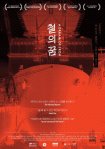Here you will find reviews of Korean documentary films. Please click on the picture, and you will be taken to the review.
Bittersweet Joke (미쓰 마마) – ★★★★☆
“Bittersweet Joke is wonderful documentary about the challenges facing single mothers in Korea. Director Paik Yeon-ah has produced an informative and entertaining film, one with an important social message that is allowed to unfold naturally throughout the course of the mothers’ lives while also debating important issues.”
“Captain Kang is a beautifully ethereal documentary about a fisherman who refuses to let his lack of legs stop him working. Wisely eschewing any sentimentality, director Won Ho-yeon captures the humble and modest captain’s life with dignity.”
A Dream Of Iron (철의 꿈) – ★★★★☆
“A Dream of Iron by director Kelvin Kyung Kun Park is a gorgeously shot documentary that explores Korea’s difficult relationship with notions of the divine. A Dream of Iron is a stunning testament to human nature’s unbridled ambition.”
Let’s Dance (자, 이제 댄스타임) – ★★★★☆
“Let’s Dance is a wonderfully frank, moving and surprisingly funny documentary about abortion. Through interviewing a diverse range of women about their experiences with the procedure. Let’s Dance is powerful testament to women who have ever considered or undergone an abortion.”
Manshin: Ten Thousand Spirits (만신) – ★★★★☆
“Manshin: Ten Thousand Spirits is a very enlightening documentary about Kim Geun-hwa, Korea’s premiere shaman. Director Park Chan-kyong beautifully captures the key events of her life from Kim’s youth in North Korea through to her life in the south. Masterfully, he also depicts Kim’s life as a shaman in conjunction with the development of Korea itself, and the preservation of cultural identity.”
“Mother is a loving and gentle tribute documenting the final years of Lee So-seon, a human rights campaigner and mother of Jeon Tae-il. Director Tae Jun-seek captures her spirit in a highly reverential manner, with his gentle style allowing her charisma to shine through.”
My Father’s Emails (아버지의 이메일) – ★★★☆☆
“My Father’s Emails is an intimate documentary with a fascinating premise. In exploring the 43 emails sent by her father after his death, director Hong Jae-hee attempts to understand her estranged parent. The film is a great examination not only of her father but of recent Korean history, to which his decisions were so inherently tied to.”
My Love, Don’t Cross That River (님아, 그 강을 건너지 마오) – ★★★☆☆
“My Love, Don’t Cross That River is a record-breaking triumph for the independent sector as the most successful non-commercial film in Korean cinema history. Director Jin Mo-young’s endearing documentary about the charismatic relationship of elderly couple Byeong-man and Gye-yeol is wonderfully heartwarming and romantic as they act like newlyweds despite their ages.”
“My Place is a funny, enlightening, and wonderful documentary about the importance of family. By using his unwed sister’s pregnancy as a catalyst, director Park Moon-chil uses his concerns as a springboard in which to explore the history and psychology of his mother, father, and his sister Peace. A superb and lovely documentary.”
Non-Fiction Diary (논픽션 다이어리) – ★★★★☆
“Non-Fiction Diary is a consistently provocative, insightful and gripping documentary. Director Jung Yoon-suk explores the role of crime and punishment in 1990s Korea with incredible vision, exploring the tumultuous events of the era through a great selection of TV footage and interviews that never stops being compelling”
An Omnivorous Family’s Dilemma (잡식가족의 딜레마) – ★★★☆☆
“An Omnivorous Family’s Dilemma is a charismatic and enjoyable documentary about pig farming in Korea. This is chiefly due to the perspective director Hwang Yun employs, who approaches the issues not only as an animal rights activist but also as a wife and mother. The contrasts between factory and free range farming are powerful and thought-provoking.“
“Red Maria is a highly interesting documentary, and director Kyung Soon deserves praise indeed for attempting to profile the subjugation of women under oppressive patriarchy in South-East Asia. It is the Filipino women who are the genuine highlight of the film, bringing incredible poignancy and inspiration to the discussion.”
“Tour of Duty is a powerful documentary about the sexual abuses suffered by Korean women in an American military town in the Uijeongbu district. The stories of sexual slavery are harrowing and poignant, while the government role by both Korea and America in the atrocities makes for an important viewing experience.”
The Truth Shall Not Sink With Sewol (다이빙벨) – ★★★★☆
“Controversial documentary The Truth Shall Not Sink With Sewol is an intelligent, insightful, and captivating film that resonates long after the credits have rolled. Directors Lee Sang-ho and Ahn Hye-ryong have crafted a powerfully charged account about the sinking of the ferry and the diving bell controversy, employing a journalistic stance that is both intellectual and sincere. A brave piece of filmmaking.”
With or Without You (춘희막이) – ★★★☆☆
“With or Without You is a fascinating and absorbing documentary regarding the role of surrogacy in Korean history. Director Park Hyuck-jee employs exquisite cinematography in depicting the lives of elderly farmers Maggi and Chun-hee, two charismatic and resolute women whose complicated history is continually poignant.”















